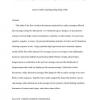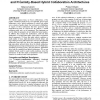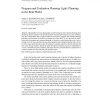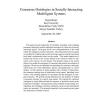19 search results - page 2 / 4 » Social Causality and Responsibility: Modeling and Evaluation |
CONNECTION
2006
13 years 7 months ago
2006
By learning a range of possible times over which the effect of an action can take place, a robot can reason more effectively about causal and contingent relationships in the world...
ICALT
2006
IEEE
14 years 1 months ago
2006
IEEE
This study of the flow of online discussions examined how earlier messages affected later messages along five dimensions: (1) evaluations (agree, disagree, or unresponsive actions...
CSCW
2006
ACM
14 years 1 months ago
2006
ACM
We evaluate response times, in N-user collaborations, of the popular centralized (client-server) and replicated (peer-to-peer) architectures, and a hybrid architecture in which ea...
IIE
2007
13 years 7 months ago
2007
Although there are many high-quality models for program and evaluation planning, these models are often too intensive to be used in situations when time and resources are scarce. A...
MAGS
2008
13 years 7 months ago
2008
This paper presents approaches for building, managing, and evaluating consensus ontologies from the individual ontologies of a network of socially interacting agents. Each agent h...




